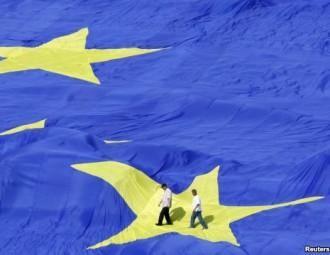Paval Sieviaryniets: Belarusians are responsible for the presence of political prisoners

While almost all democratic forces in Belarus are considered to be “pro-European” (but for the Communists, perhaps), the Belarusian Christian Democracy stands by itself.
Some BCD members repeatedly state that they have critical attitude towards modern Europe and its values. The BCD, being a Christian conservative party, cannot at all accept the policy of the European Union towards sexual minorities and gay marriages and it only partially accepts the European policy towards migrants.
However, when in 2010 Milinkevich said that the BCD was not going to join the EU, it provoked a scandal. Paval Sieviaryniets demanded a public apology from the politician. But as they say, it is an old tale.
Paval Sieviaryniets, the leader of Belarusian Christian Democracy and prominent opposition politician told “EuroBelarus” Information Service about the current attitude of the BCD towards Europe and its values.
- Paval, very often we may hear that the Belarusian Christian Democracy is somehow detached from European values. At least some members of the BCD state that Belarus does not need the Europe with its ultra-liberal attitude towards sexual minorities, migrants and gay marriages…
- The Association with the EU does not contradict the policy-making principles of the BCD. I would remind that the association with the EU is first of all a complex of political and economic principles and laws.
As for the minorities and gay marriage, there are different approaches to this issue inside the EU. We can recall Lithuania, Hungary, Poland or Austria where the position of right-wing parties, centre-right parties, Christian democratic parties and the attitude of local governments (Bavarian for example) are close to that of the BCD.
Therefore, we do not see any problems. The Association with the EU is acceptable for the BCD. Of course, what is unacceptable is compulsion, the change of program settings and requirements such as “Conduct gay parades and we will give you loans”. It is clear that we are the people of certain dignity, certain views and we will not tolerate blackmail – either from Russia or Brussels.
But the Europeans themselves have disagreement on this point. That is why I think there will be no pressure on Belarus from the European side.
Our position is very simple: we want to join Europe in order to promote Christian values together with our neighbours from Ukraine, Lithuania, Poland…The Christian factor is evident in the political sphere of these countries. We also believe that the revival of Europe as a community will take place together with the Christian values. We are willing to do our best in order to reach this goal. We are euro-optimist; but at the same time we are Christian democrats.
- There is much talking about the Eastern Partnership Summit in Vilnius. What do you expect from this event? What is the role of Belarus in the summit?
- I hope (and we are working on it) that Belarus will be represented at the Eastern Partnership Summit by a joint statement of Belarusian democratic forces. I would not like to tell you what kind of document it is, but I think it will meet support among the majority of European politicians at the summit. If it happens, if a united of Belarusian democratic forces declares its intention to the association with the EU, and if European politicians support this initiative, it will be a major victory for Belarus itself as well as for the uniting strategy of the Belarusian opposition.
- How can Europe help the democratic Belarus now? Consider it as a question to a political prisoner rather than to an ideologist of the Belarusian Christian Democracy…
- Europe can help only by using its position of principle, by the tactics of “soft power” and by influence on Belarus in general. If Ukraine signs the agreement with the EU, Belarus will have 2500 km of border with Europe and only 1000 km of border with Russia.
The influence of Europe will evidently increase. The only question is to what extent.
At the same time I think that we should not oblige Europe to be responsible for our political prisoners. It is we, Belarusians, who are responsible for the political prisoners in this country and for being controlled by Lukashenko. If there were pressure on the regime inside the country, it would be easier for the EU to provide assistance. Especially with the cases of political prisoners.
My personal stand is not to put the responsibility for the actions of the regime on people. I support targeted sanctions against those who are in charge of the repression, but I do not approve of economic sanctions against the whole country.
- Many people say about the pragmatic position of Europe towards Belarus, about the European “realpolitik”. The question is, in what sense the influence of Europe on Belarus will increase? Won’t you get the opposite of the desirable?
- O believe that “realpolitik” starts to govern, when the left-wing parties come into power in European countries. I have great respect for the centre-right parties of Europe which keep to the values in the first place, and we aspire to become members of European People’s Party.
I see that when the governments focused on Christian democracy and conservatism are replaced by more liberal or even left-wing governments, then it results in the pragmatic approach. There is no escape from it.
But the Belarusians should bear in mind that it resembles wind: either it blows from the East or from the West, we must carry on doing our own thing. Only then we may ask the Europeans to support us. We cannot depend on Europe, it cannot work miracles for us. The Europeans can only provide assistance.
After all, the fate of Belarus is decided neither in Brussels nor in Moscow, but here, in Belarus.
-
03.01
-
07.10
-
22.09
-
17.08
-
12.08
-
30.09








































